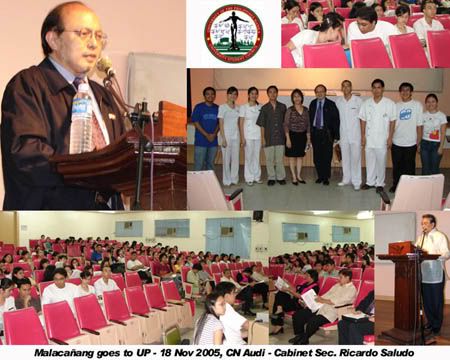Winnie Monsod on the GASC
http://news.inq7.net/opinion/index.php?index=2&story_id=57799
GASC, UP Collegian and the media
First posted 01:08am (Mla time) Nov 26, 2005
By Solita Collas-Monsod
Inquirer News Service
BLATANT disregard of the rules. Railroading. Filibustering. Abuse of power. Indecorous behavior. Disruption of parliamentary proceedings. Walkouts.
Sounds like the Philippine legislature? Actually, closer to the Taiwanese legislature, which has grabbed international attention more than once with pictures of its members engaged in free-for-all brawls inside the assembly hall; or the South Korean legislature (although I only read about it once).
But not this time. The description above applies to what happened during the two-day General Assembly of Student Councils (GASC) of the University of the Philippines (UP), presided over by the current student regent (SR, the student representative to the UP Board of Regents), a couple of weeks ago. At issue was the proposed amendments to the Codified Rules for Student Regent Selection (CRSRS), which the GASC, composed of all the student councils in the UP System, is tasked to deliberate and decide on, because it is also tasked to select the SR on the basis of the CRSRS.
The three major proposed amendments seem eminently reasonable: requiring that SR candidates must meet the minimum academic standards set in the University Code (during my time, one couldn't even be a member of a student organization if one had a red mark); removing the role of an organization called Kasama sa UP from the selection process (its role is identical to those of the university and college student councils themselves); and widening the voting base for electing the SR (a more direct manner of selection).
Reasonable as these proposals may sound, they have been rejected over and over again, every year since the CRSRS was first approved in 1997. Why? Simple: The Kasama sa UP, which is affiliated with the leftist organization Anakbayan, had controlled the selection of most student regents since 1986, and continued to hold the majority of GASC members since the latter's creation in 1996.
Until this year, that is, when the "nonaligned" (those who didn't want to be controlled by an ideology) student councils gained the majority in the GASC. At last, they thought, the reforms could push through.
But the Kasama had many tricks up its sleeve.
Usually, the GASC meets twice a year -- the first, to set the rules for the selection of the student regent, and the second, to do the actual selection. But the GASC meeting in Cebu in October was taken up just for adopting the house rules; so another meeting had to be set to consider the CRSRS itself. Delay.
The second meeting, the one that ended up making the Taiwanese legislators' antics look like child's play, was set for Nov. 12 and 13. On the first day, almost 10 hours passed before the amendment on good academic standing could be proposed-and the debate was suspended after an hour. The next day, another six hours of debate on the issue took place, even if it had been previously agreed that there would be a two-hour debate limit. Finally, there was a move to divide the house (from Len Punzalan of the School of Economics Student Council). Objections followed -- the debate must be exhausted. So another motion was made: this time to vote on whether it was time to vote on the amendment. The motion was ignored. Other motions along similar lines were continually ignored by the chair, the current student regent, a member of Kasama.
This was where Robert's Rules of Orders came in. Apparently, the rules (on P. 642 of the Newly Revised) contain "Remedies Against Misconduct or Dereliction of Duty in Office," which allows the maker himself-after exhausting all other means to get the chair to act-to stand in the chair's place and put the motion to a vote. Which was what Punzalan did. And where the melee began; the Kasama allies grabbed her mike and her papers; profanities and blows were exchanged. But the roll was successfully called-and the result was that 29 voted in favor, 1 against, 2 abstained, and 13 refused to vote.
At which point the SR unilaterally adjourned the meeting, which is a no-no, as per the rules. Which is when another storm broke out. The body appointed a temporary chair and, despite the dispersal conducted by the UP police, continued the meeting elsewhere, adjourning at 6:30 a.m. the next day-and getting the work done.
The controversy has been fully reported and analyzed in the Philippine Collegian, the UP's official student publication; and if there are dismaying similarities in the behavior of the GASC and the behavior of the Philippine legislature, it must also be said, this time thankfully, that there is no similarity between the Philippine Collegian's coverage of a controversy (at least in this case) and that of some of its supposedly more mature counterparts in the Philippine media. The Collegian news reports were unbiased and not sensationalized; its features section carefully set down the issues and the arguments for and against the proposed amendments; equal space was given to both sides in the opinion section; and letters to the editor were printed on a first come, first served basis, with the announcement that letters not included could be resubmitted, and again treated on the same basis.
Good job, Collegian. May others follow your example. This country can ill afford decisions based on incomplete, one-sided information or assertions presented as hard facts. Given half a chance, Filipinos are capable of making wise decisions.



